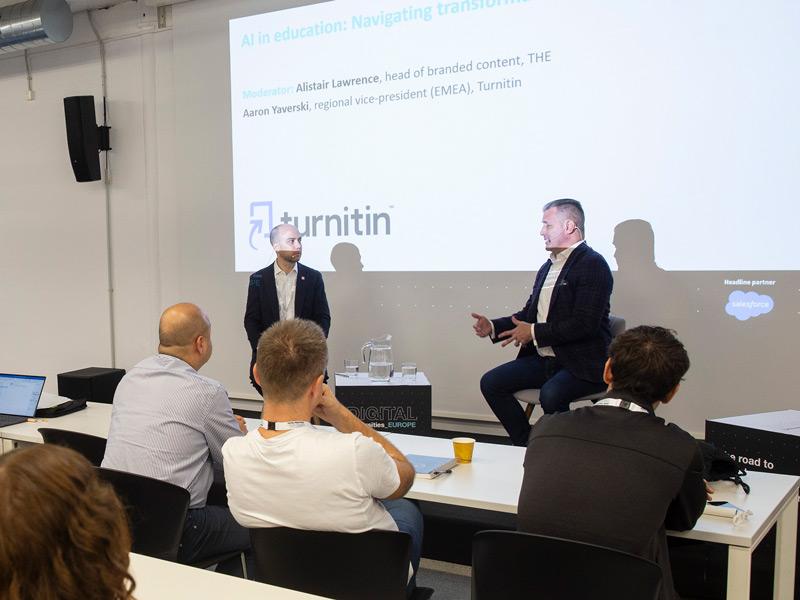When ChatGPT launched in November 2022, universities scrambled to work out how to address generative AI in the classroom. Some banned it, while others quickly incorporated it into their curriculum.
At a session during the 2023 THE Digital Universities event, held in partnership with Turnitin, Aaron Yaverski, Turnitin’s regional vice-president for EMEA, shared his views on the direction that higher education should take with generative AI.
Turnitin’s new AI writing detection feature launched in April 2023 and as of November 2023, a year since ChatGPT’s debut, it has reviewed more than 142 million papers to detect AI writing.
Yaverski said AI writing detection needs to be thought about differently. “We need to move past focusing solely on detection and misconduct,” he said. “It is just one piece of a much broader and more complex puzzle. Turnitin’s AI writing detection feature is not meant to replace educators’ professional discretion. It is meant to supply additional insights to help reach a decision.”
Yaverski said an effective way he’s seen instructors use the AI detector is to identify where students have used it in their work and discuss how they could use it better in the future. “It’s not detection from a perspective of, ‘how can I punish you?’ But rather, ‘how can I help you write better with it?’” Generative AI can be an effective tool for basic discovery and assisting students who are learning in a second language, allowing students to focus on critical thinking.
A common challenge Yaverski sees is a lack of an institution-wide policy, which means decisions are being made on a departmental or instructor level. “What we’re doing is causing a massive amount of confusion for the student. We’ve put our students in a difficult position,” he said.
Updating academic policies to include the use of AI in writing is vital. But for many institutions, such policies are lacking. A 2023 Tyton survey, called Time for Class, found that only three per cent of higher education institutions in the US have an AI policy, while 58 per cent said they were planning to develop one.
According to the study, about half of the surveyed students had already used AI to write some of their work, while 70 per cent of instructors had never used the technology. “There’s a disconnect where we have students actively leveraging the tool and instructors who may not be familiar with it. We have to narrow the gap as we think about those policies,” Yaverski said.
Yaverski said that while Turnitin doesn’t write a policy for institutions, the company offers resources to educators and institutions to help them navigate this evolving technology. He said that, globally, universities are confused about policy, but highlighted that some regions and institutions are making progress.
“We are seeing pockets of the world where they’re much more progressive about AI. In Saudi Arabia, a number of institutions are encouraging the use of AI in writing, whereas in other regions we’ve seen much more resistance,” Yaverski said.
A key to success is involving students and considering employability in AI policy creation. “We’re going to be learning over time how our students want to use these tools and how the market wants to use it,” Yaverski said. They will be the ones who determine the new uses for AI as they continue their learning journeys and careers. Turnitin is committed to being a trusted educational partner, ready to support them as new developments emerge, he concluded.
The panel:
- Alistair Lawrence, head of branded content, Times Higher Education (chair)
- Aaron Yaverski, regional vice-president (EMEA), Turnitin
Find out more about Turnitin.


comment